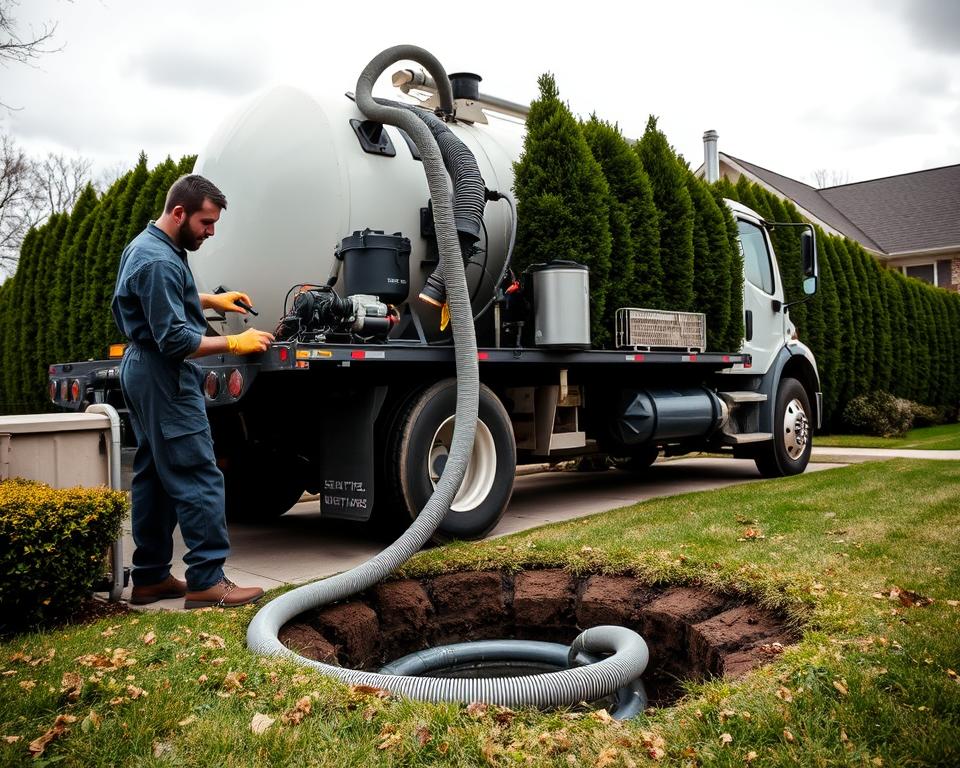Septic Tank Pump Out: Key Tips & Essential Guide
Have you considered exactly where your household waste goes after it drains from your sink or toilet? It’s handled by a carefully serviced septic system. Understanding the importance of septic tank pump-outs is essential for first-rate waste management at home. Neglecting this may cause backups and expensive remedies. This guide seeks to show the value of septic cleaning and regular pump outs. By relying on trustworthy septic services – septic inspection, you safeguard your residence, natural surroundings, and support your system’s longevity.
Key Takeaways
- Consistent septic tank pump out avoids system failures and backups.
- Grasping your septic system aids in efficient maintenance.
- Scheduling a pump out is vital for sound waste management.
- Look out for clues that indicate your septic tank needs attention.
- Choosing a competent service provider can improve system efficiency.
- Paying for septic tank cleaning services protects your home and the environment.
The Importance of Septic Tank Pump Out
Getting a septic tank pumping service periodically is crucial for your system’s durability and operation. With time, your tank fills with solid waste and organic debris, that may cause performance issues or even full system failure. Without septic system maintenance, you could face obstructed pipes and failed drain fields – problems that generally come with sizeable bills and serious inconveniences for the household.
By getting professional septic tank services carry out scheduled maintenance, you make sure your system runs smoothly. This step not only sidesteps expensive repairs but also shields the soil and groundwater around your home from pollution. Choosing regular pump outs, you support environmental health and enjoy a dependable and effective system for managing waste.
How Your Septic System Works
A standard septic system is central in handling household wastewater. It’s made up of the septic tank, drainfield, and soil – elements that cooperate to effectively process waste. The septic tank provides a contained space for solid waste to break down biologically.
It’s crucial for homeowners to know how these parts work. Keeping the septic system in good condition is vital to its longevity and effectiveness. Through routine inspections and cleaning the septic tank when necessary, owners can dodge hefty breakdowns that could result in serious health and environmental issues.
Continuously maintaining your septic system secures your property and supports public health. In the table below, see a table showing the different septic system components and their functions:
| Component | Function |
|---|---|
| Septic Tank | Holds and breaks down solid waste through anaerobic bacteria. |
| Drainfield | Filters the treated effluent into the soil for further filtration. |
| Soil | Acts as a natural filtering system to further treat wastewater. |
Grasping these elements underscores the need for careful septic system care. Smooth operation relies on steady maintenance and cleanings by homeowners.
How Often Should You Schedule a Pump Out?
Knowing when to get your septic tank pumped is vital for its health. In most cases, a septic pump out should occur every 3 to 5 years. However, a variety of factors might alter this schedule.
The occupancy level in your home heavily influences the pumping frequency. More inhabitants mean more wastewater, resulting in more regular maintenance. Moreover, habits like lots of laundry or prolonged showers might necessitate earlier pump outs. Being proactive can greatly extend your septic system’s life.
It’s wise to consider individual elements, such as tank size and daily water use, to keep a proper schedule. Remembering your last pump out date assists in timely planning for the next one, ensuring uninterrupted system performance.
Indicators It’s Time to Pump
Homeowners should be alert for indications that signal their septic tank is due for a pump out. Sluggish sinks and toilets often indicate an full septic system, impeding the wastewater flow. Moreover, bad smells around your home could indicate issues; they may emanate from the tank, showing system failure.
Visible wastewater pooling in the yard is another significant indicator. If your lawn has wet spots or unexplained puddles, it’s likely your septic system is struggling. Overlooking these signs can develop into more serious issues that disturb your home and become expensive to resolve.
To head off serious complications, timely maintenance is crucial. Hiring a professional service like All in Sanitation can be a wise decision. They can properly diagnose and resolve these signs. This method not only handles immediate issues but also preserves your system’s efficiency and health.

Selecting a Pump Out Provider
It’s crucial to pick a skilled septic tank pumping service to keep your system running smoothly. Reputable companies understand the local regulations thoroughly, ensuring your septic system satisfies all requirements. A solid service, like All in Sanitation, is dedicated to disposing of waste responsibly. This is important for the environment’s well-being.
In seeking the right septic service, consider these important aspects:
- Experience and Reputation: Aim for companies with excellent feedback and long-standing success in your region.
- Licensing and Insurance: Check that your chosen provider has the proper license and insurance to cover unexpected problems.
- Comprehensive Services: Prefer a service that offers inspections with pumping, identifying issues before they grow.
Putting money into a good septic tank pumping service avoids big future repairs. Regular evaluations and consistent upkeep keep your system in excellent form. Choosing wisely not only protects your investment but also sustains a robust waste management system for your home.
Septic Tank Cleaning: What You Need to Know
For homeowners, septic tank cleaning is vital to ensure the system operates correctly. During this process, eliminating sludge and scum is crucial to avoid blockages. A cleaned system not only functions better but also lasts longer. Conducting regular cleanings is important for the health of your system.
Many homeowners add extra services to improve septic tank care. These add-ons are important for destroying harmful bacteria and halting residue build-up. Recognizing the value of proper maintenance can save you costly overhauls. Remaining proactive in maintenance ensures both environmental safety and household well-being.
What Pumping Services Cost
Homeowners need to know septic tank pumping costs for effective system maintenance. Prices differ widely due to region, tank size, and chosen service provider. Typically, this service costs between $200 and $600. It’s smart to collect bids from different companies, evaluating both expertise and reliability.
Service providers like All in Sanitation supply competitive rates. Yet, the cost of septic tank cleaning reflects service quality and thoroughness. Homeowners should consider these aspects carefully when choosing a service.
Comparing quotes enables smart selections that suit your budget and septic system needs. Grasping potential costs assists in financial planning for septic tank upkeep.
Septic System Maintenance Tips for Homeowners
Caring for your septic system properly is critical. It secures a robust and well-functioning setup. By implementing straightforward steps, the longevity of your septic tank extends, and saves money. Measures like cutting back on water use in your household are highly beneficial. Fixing leaks promptly and installing water-saving appliances are helpful actions.
It’s important to avoid flushing harmful substances down the drain. Chemicals, fats, or non-biodegradable items hurt your septic system. For the health of your setup, discard such waste correctly. This practice protects your septic tank’s natural processes.
Consistent inspections and the timely pumping are non-negotiable for septic maintenance. Aim to have your system reviewed and serviced every three to five years. A maintenance schedule or checklist can be highly effective. It assists homeowners in checking their system’s condition and following maintenance guidelines.
Acting ahead with septic maintenance offers financial and environmental benefits. When you practice these habits, homeowners boost their septic systems’ efficiency and dependability. This commitment not only preserves your system but also promotes a healthier environment.
To Conclude
A septic tank pump out is vital for septic tank upkeep, and homeowners should consider it with care. It wards off hefty bills and extends the system’s lifespan, allowing for efficient operation long term. Knowing when to address system distress signals protects your property.
Opting for a trusted provider, like All in Sanitation, makes all the difference in septic tank care. Their expertise ensures proper service, promoting both environmental health and your home’s comfort. Preventive care guards your investment and supports a greener planet.
Staying informed about your septic system and its maintenance needs is key. Regular pump outs improve home functionality and support public health. For any homeowner, realizing the value of septic tank care ensures a efficient living environment for the future.

